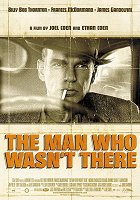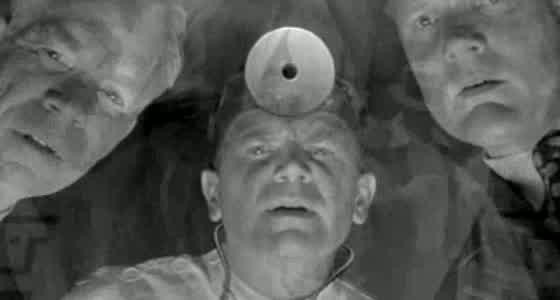Cinematography:
Roger DeakinsComposer:
Carter BurwellCast:
Billy Bob Thornton, Frances McDormand, Michael Badalucco, James Gandolfini, Katherine Borowitz, Jon Polito, Scarlett Johansson, Richard Jenkins (more)Plots(1)
1949, Santa Rosa, California. A laconic, chain-smoking barber with fallen arches tells a story of a man trying to escape a humdrum life. It's a tale of suspected adultery, blackmail, foul play, death, Sacramento city slickers, racial slurs, invented war heroics, shaved legs, a gamine piano player, aliens, and Heisenberg's uncertainty principle. Ed Crane cuts hair in his in-law's shop; his wife drinks and may be having an affair with her boss, Big Dave, who has $10,000 to invest in a second department store. Ed gets wind of a chance to make money in dry cleaning. Blackmail and investment are his opportunity to be more than a man no one notices. Settle in the chair and listen. (Napa Valley Film Festival)
(more)Reviews (8)
Brilliantly shot and acted film noir about an insignificant loser’s descent into a fatal abyss. It's just a shame that the screenplay stumbles in the second half, after it lays its cards on the table in a conceptually brilliant way in the first half. The crucial twists come across as overwrought and the last one does more harm than good. *** SPOILER! *** The scene with the spinning bullet should have turned out differently, and Ed should have grown old knowing that he had destroyed the last, purest thing that mattered to him.
()
The Coen brothers are aging like wine and getting better and better with each film. Billy Bob here shows an unbearable lightness of non-existence and with his stony expression delivers a powerful performance. I love the poetics of the Coens, I love their sense for the absurd, and you’ll get that in this film to the fullest. A clear five-star affair.
()
As a novice with only a tiny fraction of the Coen brothers' filmography passing through my hands – moreover, the least pivotal works – I sometimes felt like Alice in Wonderland while watching The Man Who Wasn't There. The script is ordinary at first glance, "dabbling" in all sorts of brackish waters, but as a whole it totally unique. The film is filled with plot twists, with each situation leading to a contrary outcome from the established logic. Director Joel Coen presents everything in a slow, retro style reminiscent of post-war America in the 1940s. He acts as a meticulous guide, pausing with the audience in each scene and offering a detailed analysis of the characters and their diverse personalities. Ed's description of meeting his wife - including the "pause" - is brilliant. Behind the camera, Roger Deakins works with his instrument just like his predecessors from the 1940s, and when combined with the subtle piano music, you'll regret not living in that era. Actually no, you won't regret it, because the austere description of Ed's life will disgust many a viewer. I know that Billy Bob Thornton is an excellent actor, but only here did I have to prove to myself that he is ultra-brilliant. With a perpetually lit cigarette, he walks, talks, and acts in such a stylish manner that you feel like inviting that guy for a drink, over which you both would vent about life. The Man Who Wasn't There is exactly the kind of film that turns zero expectations into gold. More of this!
()
A black COMEDY? They said they were playing for him. There's about as much humor in The Man Who Wasn't There as there is in Kafka's “The Trial", and it's a classic of world existentialism that would be proud of Ed Crane's character and fate. True, the Coens’ hero is somewhat more active and plays out the tragedy of his fate himself, a decision that is as sleepy and incomprehensible as him. And in the growing current of fateful events, Ed is also trying to swim a little more than the surrendered Josef K. However, his disillusionment is even worse. The Coens created an incredibly impressive, plastic and stylish portrait of a man-loser whose life eluded him and who at one point became a ghost for others (and for himself). The strongest thing is Ed's character, who was played with incredible credibility by Billy Bob Thornton. The initial impression that he is a cold cynic who has simply declared eternal silence on the world grows into a strong affiliation with an ordinary man who is silent in a world he does not understand and which does not understand him. By the end, Ed Crane's ice mask is finally gone, and the viewer suddenly faces a character so human that it reminds him of our daily little existential inferno in the outlines. Behind the wrinkles and rigid grimace of the main character lies an incredibly fragile human core, a core that melts while listening to Beethoven's piano compositions, a core that would like to speak but cannot, because it does not know what to say. Long after Ed was watered with the light of eternity, I sat staring into the darkness, relishing the feeling that the Coens had accomplished something truly GREAT. A film as black as a freshly painted coffin, a perfect urn full of absurdity. The cremation of everyday life.
()
A lineup of favorite Coen-esque actors in a straightforward and darkly comedic homage to noir. And although I greatly enjoyed Ed's darkly toned journey, the silent parts of the legal plot deliver unnoticed blows below the belt. However, everything else is excellent, from the brilliant Thornton to the adorable Scarlett, the superb atmosphere, and the beautiful piano soundtrack.
()
This psychological drama in the style of 1950s noir couldn’t have been made better. It's true that the Coen brothers will probably never make anything completely "normal" again and their slightly monotonous narrative won't be to everyone's taste, but it all worked perfectly here. Hand in hand with great cinematography, a well-chosen black-and-white production design and last but not least the traditionally fabulous Billy Bob Thornton in the lead role, the tribute immediately becomes a little easier, especially when all that is in the hands of directors whose films have a completely different style than all the others. It may not be perfect, the story isn't exactly packed, and it certainly could have done with a lot less than 110 minutes, but it’s still worth watching for Thornton's haunting voice and final look alone – and not only once.
()
The most depressing comedy I've ever seen.
()
Billy Bob Thornton's nihilistic voiceover is all the more familiar because it's basically unchanging from start to finish, no matter what's happening on screen. This noir crutch for The Man Who Wasn't There (a brilliantly apt title) is aesthetically essentially perfect, and represents Coen's captivating visual style at its best. In terms of the screenwriting, it's not all that revelatory (especially in the last act), but all the other ingredients are so compelling that it doesn't detract from the result. The seemingly uninvolved speech of the central character, who somehow oscillates between phlegmatic and apathetic, is simply brilliant. I think that every great filmmaker has such a semi-landed film in his filmography, one which lies more in the shadow of the biggest hits, but which is similarly captivating as the biggest hits. With the Coen brothers, this is that film. [90%]
()

